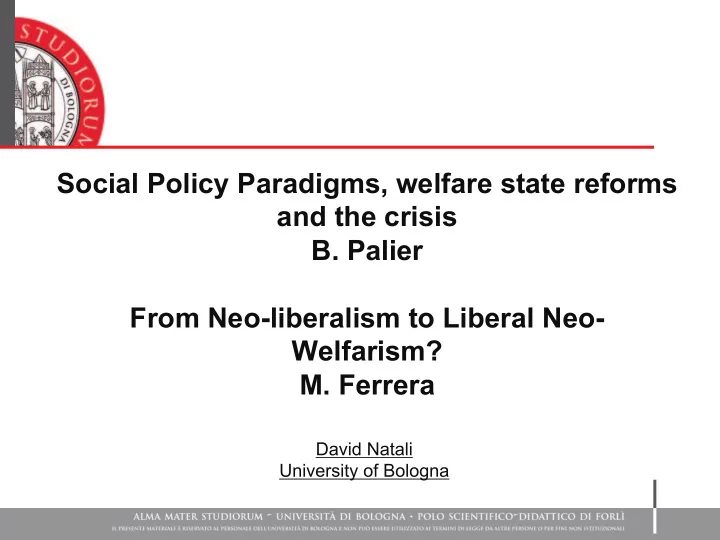

Social Policy Paradigms, welfare state reforms and the crisis B. Palier From Neo-liberalism to Liberal Neo- Welfarism? M. Ferrera David Natali University of Bologna
Social Policy Paradigms, welfare state reforms and the crisis, B. Palier What is the paper about? - long-term waves in social policy paradigms - the evolution of the European welfare regimes (persistent divergence) - the impact of the crisis - some insights about probable future developments
Key advancements • Convincing reading of decades of welfare policies • Clear distinction between policy paradigms and welfare regimes • Evidence-based analysis of challenges, reforms’ outputs and outcomes • Non-ideological or partisan reconstruction of the welfare state debate • Mixing the literature on social investment with that on dualisation
More complex aspects (I) • Definition of the Social Investment Perspective � Overlapping concepts used in the literature, enabling state, active social policies, etc. (Barbier, 2012) � M. Nadel on public policy ‘I don't know how to define it, but I know it when I see it’ For Social Investment, ‘I know how to define it, but I don’t know it when I see it’ � Problems in recognising policy outputs (RSA in France; Targeting in UK, etc.) (de la Porte and Jacobsson, 2012) and outcomes (Cantillon, 2011) � Is it a true paradigm? How many Social Investment(s)?
More complex aspects (II) • Welfare modeling, beyond the three worlds of welfare � Original focus on old age, sickness and unemployment protection � Labour market (protection/segmentation) � Healthcare • How many worlds of welfare? � Is the Southern European model in? • More than Welfare … � Need for explicit focus on industrial relations and capitalist models
What prospect for future research? • Be brave and go beyond Esping-Andersen � Mixing welfare state analysis with VoC and IRL (Thelen, Palier and Thelen, Baccaro, 2011) � Explaining the SI failure • Look more at the distributive recalibration � Redrawing the coverage models • The future of the Social Investment and the EU � Explicit endorsement?
From Neo-liberalism to Liberal Neo- Welfarism?, M. Ferrera What is the paper about? •Ideological turns at the end of the 20 th century •Discursive neo-institutionalism •End of neo-liberalism followed by the Liberal neo- Welfarism (LNW) •‘Ping-pong’ analytical perspective between supranational arena and national reforms
Key advancements • Convincing reading of the ‘parabola’ of ideological turns • Fascinating elaboration of the discoursive neo- institutionalism (Schmidt) � Tracing the role of ideologues (policy middle-men; academics/politicians hybrids, etc.) • Focus on ideas is not detrimental of broader analysis of the role of interests and institutions � The role of ‘Brussels’ • Lights on the potential articulation of political struggle and coalitions
More complex aspects (I), how deep is the ideological turn? • Ideological components � Core components � Adjacent components � Peripheral components • Last turn from NL to LNW is radical or marginal? � NL was so dogmatic or more plastic and thus able to regenerate? (Steger and Roy, 2010) � How stable is the new synthesis (between liberty and equality)?
More complex aspects (II), ideological turn and societal transformation • Ideological change being the result of societal, political, and philosophical and ideational transformations � The fall of Neo-lib as a consequence of globalisation and post-industrialism (consistency and timing) � If NL was not able to forge new social and electoral coalitions…has the LNW able to do it? If Thatcher failed…Zapatero succeeded?
More complex aspects (III) policy and institutional change • Ideology keeps a foot in the realm of political thought and a foot in the realm of political action (Freeden, 1996) • From Ideological change to institutional and policy change � EU trends in the 1990s: Amsterdam Treaty, EES, Nice Treaty, Social OMC But still EMU, SGP, Single Market (Institutional � inertia?)
What prospect for future research? • What impact of the crisis? A new societal transformation? � • Need to test the effectiveness of past institutional changes Conficting views of the Lisbon Strategy and Europe � 2020 � European Semester and Euro Plus Pact
What prospect for future research? • Need to monitor the next institutional changes Social Investment Pact (or package) � • Look at the dynamics and potential coalitions � Purple coalitions/Grosse Koalition/Social-dem and far left?
David Natali University of Bologna david.natali@unibo.it www.unibo.it
Recommend
More recommend